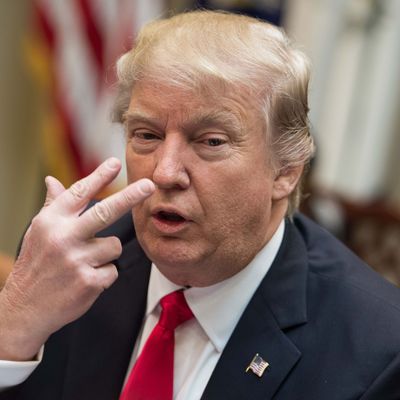
Donald Trump insists that his Muslim ban, or extreme vetting that is definitely not a ban, or his ban of something but not Muslims, is going extremely smoothly. “It really is a massive success story in terms of implementation on every single level,” explained a senior administration official. And yet news has depicted scenes of chaos, confusion, and inhumane treatment of innocent people. The administration has thus been forced to supply a series of defenses:
1. President Obama did the same thing. “My policy is similar to what President Obama did in 2011 when he banned visas for refugees from Iraq for six months,” insists Trump. Multiple fact-checkers have examined this claim and found it wanting. In response to intelligence linking two refugees from Iraq to a bomb attack on American forces there, the Obama administration slowed, but did not stop, its refugee-admission process in order to tighten its screening. A tightening of vetting procedures in response to specific intelligence about a single country is not the same thing as a sweeping halt in the absence of a reported breach.
2. Only 109 people were detained. It’s not clear where Trump got this figure, but the Department of Homeland Security announced that in the first 23 hours alone, 375 people were detained.
3. There were some big problems, but it was caused by Delta’s computer system.
In fact, problems began Friday night, and Delta’s system went down Sunday night, and was fixed after a few hours.
4. The premier president loves surprises. Possibly the most interesting defense is that the administration was unable to use the normal interagency review process because it would have tipped off the terrorists. “What we couldn’t do was telegraph our position ahead of time to ensure that people flooded in before that happened, before it went into place,” said White House spokesman Sean Spicer. “If we had telegraphed that ahead of time, then that would have been a massive security problem.” President Trump, as usual, put the argument in pithier terms:
This defense suffers from two enormous flaws. First, it assumes that allowing agencies tasked with security to have input on a policy would be tantamount to publicizing the policy. The president is supposed to be able to discuss plans in confidence without assuming they will be leaked immediately. That is how the federal government works. If the only way to announce a foreign-policy move was to keep new policies a closely guarded secret within the administration, then this kind of amateurism would be standard. There is a long record of American presidents announcing surprise foreign policy decisions that were planned in advance by officials other than a speechwriter in his early 30s and a Breitbart lunatic.
The second problem with this defense is that it assumes terrorists were sitting around the world, planning to enter the United States to launch an attack, and able to enter at any time, but lacking any special urgency. (Perhaps they were waiting for the fares to drop.) An announcement of one week’s notice would have given them just the motivation they needed to hop on a plane.
This bears no relation to reality. People from the countries banned by Trump already face an extensive, 20-step vetting process that can take up to two years. None of them could have legally made it through within a week, or anything close.
And once you realize this, it becomes clear that Trump’s policy was not only bungled in its implementation but conceptually flawed. Trump originally proposed a “Muslim ban.” But he had to back away from this policy given that it is both unconstitutional and transparently unenforceable (how do you prevent a terrorist from lying about his religion?). This forced Trump to relabel his policy “extreme vetting.” But the reality is that vetting is already extreme. Trump has not identified any weak points in the vetting procedure. Indeed, there is no connection whatsoever between his policy and any terror incidents in the United States. Radicalized domestic American terrorists have all come from countries not on Trump’s list. His policy grows out of a need to take some kind of action.
In a way, it makes perfect sense that he would skip the normal interagency review — input from security experts would only reveal that Trump’s plan has no relationship to any security objective. The purpose of this policy is to retroactively justify Trump’s campaign fearmongering.






























